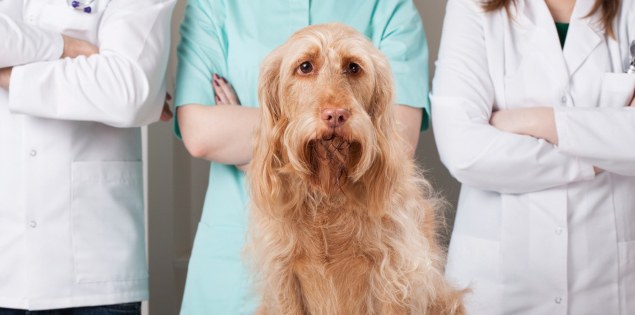“This post contains affiliate links, and I will be compensated if you make a purchase after clicking on my links.”

We’re all familiar with drug-sniffing dogs, seeing-eye dogs, and search and rescue dogs – but there are quite a few medical contributions from dogs that might surprise you! From seizure and pregnancy detection to sniffing out cancer, these medically trained dogs are amazing. In an article from Stacy Conradt at mental_floss, we learned of 10 life (and lifestyle) saving skills of these specially trained pups.
Doctor Dogs! 10 Amazing Medical Contributions From Dogs
1. By smelling out peanuts. For kids (and adults) with severe peanut allergies, this is a life-saver – literally. Some dogs can now be trained to detect anything with a peanut scent – so it’s not as if the dog will only do good if you have an open can of Planters on the counter. Among other things, peanut oil is used for cooking and peanut shells are often used in potting soil. I’m sure those of you with peanut allergies can tell us a hundred other ways peanuts cause you grief in unexpected ways.
2. By serving autistic people. Sometimes autistic people can get overwhelmed by a situation with a lot of stimuli, and a service dog can help them understand what should be prioritized. For instance, if the phone was ringing and the smoke alarm was going off, some autistic people may decide to answer the phone. A dog trained to help that person would help them get outside as soon as possible.
3. By helping when their owner has a seizure. A person prone to seizures can get a dog that is trained to get help, by trying to get the person to come back around if they have passed out and by keeping the person from walking into things or falling (some big dogs are actually trained to “throw” themselves under a person’s head when they are fainting). And some dogs actually detect a seizure before it happens based on the human’s change of behavior and scent – but this isn’t a trainable thing, according to National Geographic. It’s an innate ability based on the dog’s level of awareness.
4. By detecting low or high blood sugar levels. If diabetics don’t know their blood sugar is low, they can get a dog that can smell the change in sugar levels. The dog then alerts the diabetic (often by barking), which triggers the diabetic to test their sugar and act accordingly.
5. By helping people with psychiatric problems. Some dogs can even be trained to help people with problems like paranoia, schizophrenia or posttraumatic stress disorder. They can’t really do much to stop delusions, but they can help stop behavior that causes the person to injure themselves, or, like diabetics, dogs can help “remind” the person that they need to take their medication. They can also guide the person out of a situation they perceive to be causing stress, or help steady the person if they get dizzy.
6. By detecting cancer. Yep – studies have shown that dogs can smell bladder cancer in urine. In fact, during one study, the dogs actually proved the researchers wrong. Researchers were given a urine sample that they were assured was cancer-free to be used in a test against other samples. When dog after dog continued to select the cancer-free sample, researchers got frustrated and started to become convinced that preliminary tests had been wrong; that dogs actually couldn’t detect bladder cancer. Then, on a whim, they sent the cancer-free urine sample in for a test. It turned out that the person who provided the sample did have cancer – bladder cancer.
7. By sniffing out bed bugs! Worried about that questionable hotel room? In certain parts of the country, you can hire dogs to come in and smell for pests. Right now, bed bug-sniffing dogs are used mostly by Housing Authority-type places to ensure that apartments and public housing units are up to par, but they are starting to be employed for private use as well.
8. By helping the hearing or seeing impaired. Of course, dogs that do this are probably the most well-known type of service dog. They’re trained to answer to sounds their owners can’t hear, obviously – doorbells, smoke alarms, alarm clocks – or help guide them. But they’re also trained to ignore their masters, which is a tricky task. Not always, but if their owner urges them to walk ahead and there’s danger looming (such as traffic), the dog knows to refuse to obey until their owner understands what’s going on.
9. By sniffing out drugs… on teens. You’ve seen drug-sniffing dogs at airports, but now they’re being turned on the bedrooms of teenagers in some states. In Ohio and New Jersey, suspicious parents can hire a drug-sniffing dog for $200 an hour to scour their kids’ bedrooms for illegal substances. It might be a stretch as far as the “medical community” is concerned, but I bet a parent who could have prevented an overdose would be grateful for the saved emergency room trip.
10. Dogs that can smell pregnancy. Yep – your dog probably knows you’re pregnant before you do. It might not know that you’re pregnant, exactly, but it can smell hormone and pheromone changes, which can often result in your dog becoming more protective (or more possessive of the coveted spot on your lap). It can swing the other way, too – your dog might decide that the guy in the house is a much better person to be around for nine months. While pregnancy detection may not exactly be the benefit to society that cancer and low blood sugar detection are, I find it pretty interesting nonetheless.
Read more here. Tell us, do you have any first-hand experience with any of the amazing medical contributions from dogs mentioned above? Or, do you know of anymore that aren’t mentioned? Tell us your stories and comments below!





















